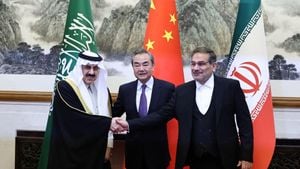Recent remarks from Trump administration officials have sparked debate over the characterization of Russia's actions in the Ukraine war. During interviews on February 23, 2025, Defense Secretary Pete Hegseth and Middle East special envoy Steve Witkoff guided the narrative away from clear blame on Russia for its invasion, which began with extensive aggression against Ukraine three years ago. Hegseth, speaking on Fox News, suggested the situation was too "complicated" to simply label Russia as the starting aggressor.
Hegseth's comments came amid growing scrutiny of former President Donald Trump's narrative around Ukraine, where he has publicly positioned the Ukrainian President Volodymyr Zelenskyy as partially responsible for the conflict rather than unequivocally condemning Russia's invasion. When asked about Russia's role during the Fox News interview, Hegseth indicated, "I don't need to get drawn too much or too deeply. We understand the stakes of this game." This phrasing avoids attributing direct responsibility to Russia for launching its full-scale attack on Ukraine on February 24, 2022.
The discussion intensified when Hegseth posed the question of whether "finger-pointing and pearl-clutching" would advance the peace process. His intent seemed to shift the focus from acknowledging blame to finding pathways to resolution. “Standing here and saying, ‘You’re good, you’re bad; you’re a dictator, you’re not; you invaded, you didn’t,’ is not useful. It’s not productive,” he remarked, implying it might be counterproductive to acknowledge the facts straightforwardly.
Meanwhile, Witkoff echoed Hegseth's sentiment during his appearance on CNN, contending the Ukraine war needs resolution irrespective of who sparked it. Witkoff noted, "The war didn’t need to happen. It was provoked," sharpening the focus on political circumstances around NATO expansions as potential factors rather than purely Russian aggression. He argued, “There were all kinds of conversations back then about Ukraine joining NATO. That didn’t need to happen. It basically became a threat to the Russians.”
This narrative aligns with Trump's broader approach to the issue, having criticized Zelenskyy, the leader of one of the U.S.'s closest allies, without delivering similar rebukes to Russian President Vladimir Putin. Last week, when pressed on whether he considered Putin to be a dictator, Trump sidestepped the question, stating, “I think President Putin and President Zelenskyy are going to have to get together, because you know what? We want to stop killing millions of people.” The divergence between how these leaders are discussed reflects the complex interplay of U.S. foreign policy interests and Trump’s unique stance on foreign relations.
These public comments from Trump officials signal a notable shift from previous U.S. positions, which typically condemned Russia's actions outright. Instead, they seem to favor dialogue over direct confrontation, positing peace talks as the priority, potentially at the expense of blatant moral clarity on the issue. While acknowledging the multifaceted history surrounding Ukraine—an Eastern European nation seeking to assert its sovereignty and embrace Western alliances—the officials seem to reframe the public conversation to advocate for negotiation through criticism of perceived polarization.
Critics have raised concerns about this strategy, arguing downplaying Russia's role could embolden its aggressions, undermining not just Ukraine's security but also destabilizing the broader European region. The delicate balance the U.S. attempts to navigate now involves appeasing Putin's posture without entirely sidelining Ukraine—an arduous, if not paradoxical, task.
With Trump administration officials making these claims, the impact on U.S.-Russia relations remains to be seen, particularly as the conflict persists. Trump's repeated criticisms of Zelenskyy juxtaposed against his reluctant approach to Putin suggest potential shifts not just within party lines but also throughout American responses to global conflicts.
Whether such comments lead to meaningful change on the battlefield remains questionable. What is clear, though, is the intensified scrutiny of leadership narratives around the Ukraine war, alongside the challenging task of placing the pieces for peace without retreating from geopolitical realities on the ground.



